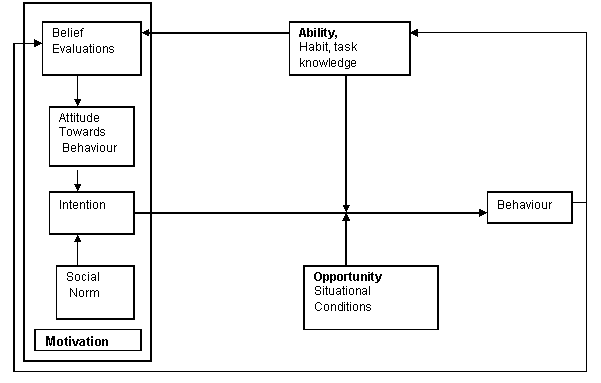The Motivation- Opportunity -Abilities model
Another well-known attempt to construct an integrative model for consumer action is the Motivation-Opportunity-Abilities (MOA) model proposed by Ölander and Thøgersen (1995). They pointed to the improvements in predictive power achievable by incorporating an ‘ability' concept and a concept of facilitating conditions or ‘opportunity' to perform the behaviour into the model (Figure 4). The Motivation component of the MOA model is recognisable in Figure 4 as a simplified version of the Theory of Planned Behaviour (see figure 1 Section 3). However, Ölander and Thøgersen (1995) also suggest several other possibilities here.
Figure 4: The Motivation-Opportunity-Ability Model

The ‘ability' concept is supposed to incorporate both a habit and a task knowledge element. Its inclusion in the model draws support from a variety of places, including previous research on waste separation and recycling behaviours (Kok and Siero 1985, Pieters 1989, 1991, Thøgersen 1994). Habit is both an independent determinant of behaviour and a moderator of intention. The influence of situational factors on consumer behaviours has been raised a number of times in this review. The opportunity component of the MOA model is clearly related to Stern's notion of external conditions. Though Ölander and Thøgersen prefer to see opportunity as ‘objective preconditions for behaviour', this aspect of the model also has some similarities with Ajzen's concept of perceived behaviour control – at least in so far as the latter concept is regarded as being a proxy for actual behaviour control. Evidence for the importance of situational factors as a precondition for pro-environmental behaviour is plentiful (Johansson, 1993; Thøgersen 1990; Guagnano et al ., 1995).
The important structural feature of the MOA model is its attempt to integrate motivation, habitual and contextual factors into a single model of pro-environmental behaviour. This is even more important as energy behaviour is mainly habitual behaviour, rather than based on conscious decisions.






